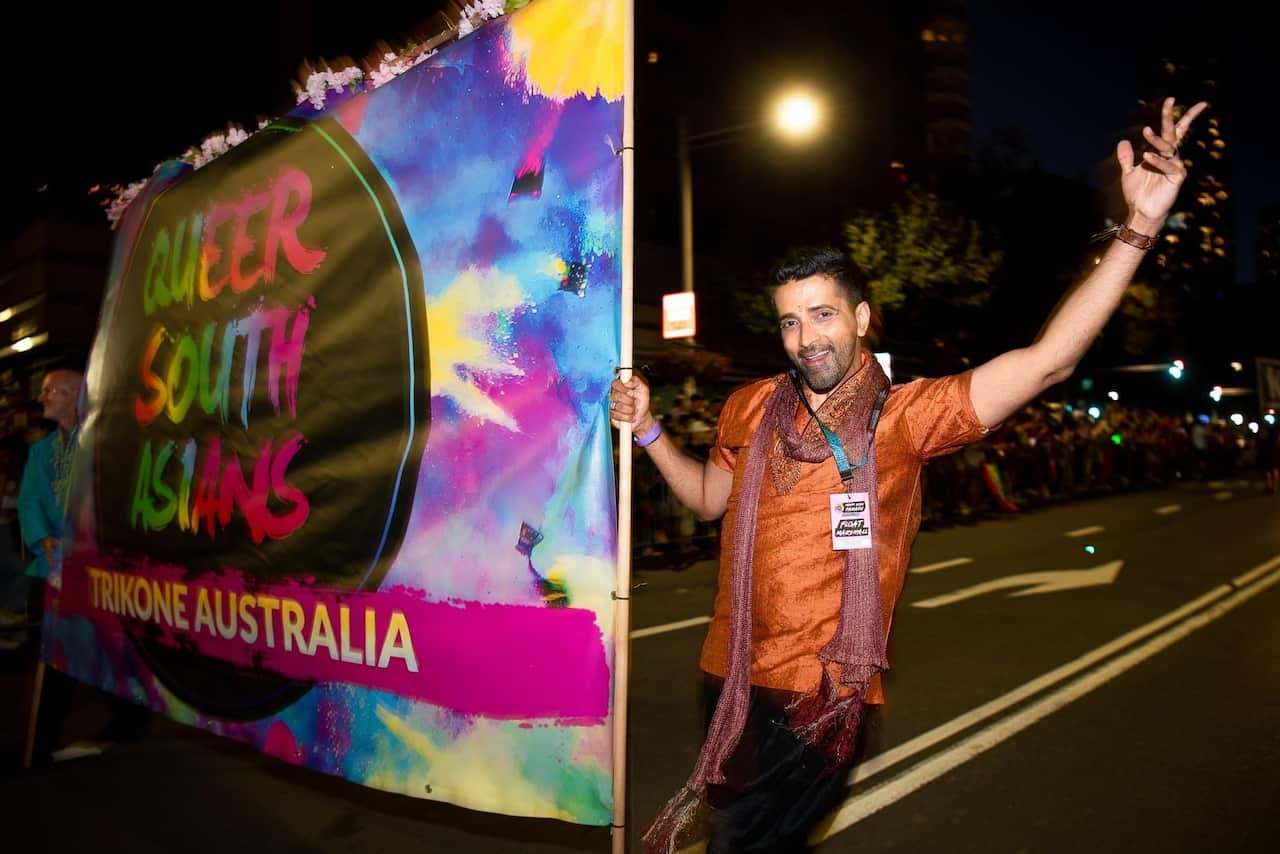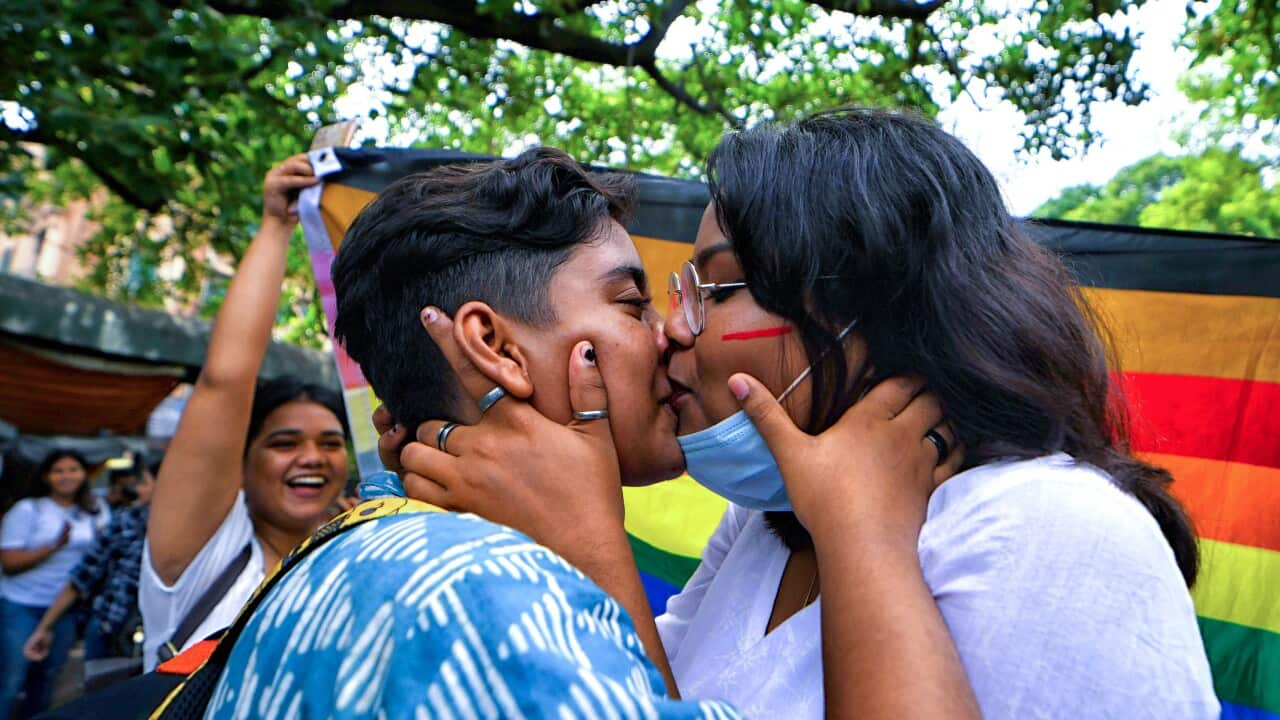Key Points
- India's Supreme Court is deliberating the legalisation of same-sex marriage.
- It comes after petitions from same-sex couples in courts across the country.
- Prime Minister Narendra Modi's government has opposed the petitions.
Kunal Mirchandani did not think he would see same-sex legalised in India in his lifetime, but that could be about to change.
The country's Supreme Court started hearing arguments on petitions from couples seeking official recognition of same-sex marriage on Tuesday.
The government and religious leaders in India oppose same-sex marriage.
Mr Mirchandani, who is chair of Trikone Australia - a networking and social support organisation for LGBTIQ+ Australians of South Asian descent - described the case as "truly momentous".
"I never thought I would see something like same sex-marriage pass in India in my lifetime," he said.
"So if it does, it is going to be an exhilarating sense of 'wow, this just happened'."
If the case is successful, Mr Mirchandani expects there will be backlash.
"I didn't think India would be in a position where it could do that this year, but having said that I would love to be surprised," he said.
"If it does happen I think the effects will be two-fold ... I think it would be a big win for gay rights, but I also feel there is going to be a huge, huge backlash amongst the public and huge opposition."

Kunal Mirchadani says he never thought he would see same-sex marriage legalised in India in his lifetime. Source: Supplied / Kunal Mirchadani
Is India about to legalise same-sex marriage?
A five-judge bench in India's Supreme Court, headed by Chief Justice Dhananjaya Yashwant Chandrachud, started hearing the case on Tuesday, with a live stream broadcast on the court's website and on YouTube.
At least 15 appeals have been filed with the court in recent months stating that without legal recognition, many same-sex couples could not exercise rights such as those linked to medical consent, pensions, adoption or even club memberships.
Activists have estimated India is home to an LGBTIQ+ community of approximately 135 million people.
Sanjay Alapakkam, board member of Trikone, says he is "cautiously optimistic" about the case.
"The Supreme Court over time seems to have become more liberalised to this issue; the current chief justice who is presiding this case also handed down the judgment that led to the decriminalisation of gay sex in 2018," he said.
"So I think there is a good chance of it getting up, while still being cautiously optimistic."

Sanjay Alapakkam is "cautiously optimistic" about same-sex marriage being legalised in India. Source: Supplied / Sanjay Alapakkam
"It doesn't look likely that they're going to make it very easy for marriage to be fully realised for same-sex couples," he said.
"When it comes to issues of people who want to open a joint bank account, or be able to adopt children as a couple ... there could be a lot of obstructionism that we can see from the ruling party."
Is India 'lagging behind' the rest of the world?
Gay marriage is legal in 34 countries around the world, with the Netherlands being the first to legalise it, in 2001.
It became legal in Australia in 2017 following a national plebiscite.
Christopher Diamond, deputy director of the South Asia Research Centre and lecturer in the Hindi language at the Australian National University, says India is not very far behind other countries.
"It is quite recent for other countries to have legalised same-sex marriage ... so it's not that far behind," Dr Diamond said.
"In terms of Asia, it is quite ahead - Taiwan was the first Asian country to have a proper structure, Nepal is on the pathway, but now India is kind of going from zero to 100."
Dr Diamond says the reason for laws and attitudes in India could partially be attributed to British colonial laws.
"The law prohibiting certain kinds of relationships, individual religion marriage laws, those were all instituted under British colonial rule, and you see that across former colonial nations," he said.
"A lot of this is the remnant to colonialism, the remnant or response to that, and also many developing nations see this as further down the list of needs of the nation; development comes first and social issues come second."
Does the Indian government oppose same-sex marriage?
Prime Minister Narendra Modi's government has opposed the appeals on the grounds that same-sex marriages are not "compatible with the Indian family unit concept of a husband, a wife, and children".
The government said the Supreme Court had to "take into account broader views and voice of all rural, semi-rural and urban population, views of religious denominations".

Indian Prime Minister Narendra Modi's government opposes same-sex marriage. Source: AP / Rafiq Maqbool
"Dismiss the present batch of petitions on grounds of maintainability," said the 102-page filing, which added that any court decision to recognise same-sex marriage would mean a "virtual judicial rewriting of an entire branch of law".
What rights does the LGBTIQ+ community have in India?
LGBTIQ+ rights in India have expanded in recent years and - if the current case is successful - the country would become only the second Asian jurisdiction after Taiwan to recognise same-sex unions.
In 2014, transgender people were given official recognition as a "third gender", and three years later India's top court recognised sexual orientation as protected under a fundamental right to privacy.
A year later came the landmark ruling striking down a colonial-era law that banned gay sex, and in 2022 the court ruled that unmarried partners or same-sex couples were entitled to welfare benefits.

Kunal Mirchadani says India legalising same-sex marriage would be "truly momentous". Source: Supplied / Kunal Mirchadani
'A huge taboo'
Mr Alapakkam says the legalisation of same-sex marriage could make a difference not only in India, but also for diaspora around the world.
"Watching here, as an Indian-Australian, it is very heartening," he said.
"Being gay at all is a huge taboo when it comes to Indian community and I see that even here."
Mr Alapakkam said while he has come out as a gay man to most people in his life, it remains difficult to explain his sexuality to older relatives and family friends.
"There's just not that broad level of acceptance and visibility," he said.
He says the legalisation of same-sex marriage would be affirming for same-sex couples, and enable them to participate in Indian wedding celebrations alongside other couples.
"Weddings are a huge part of Indian culture ... so having the ability to actually pursue one and have it recognised shows that you're not any less, and that could really pave the way for broader social acceptance."













